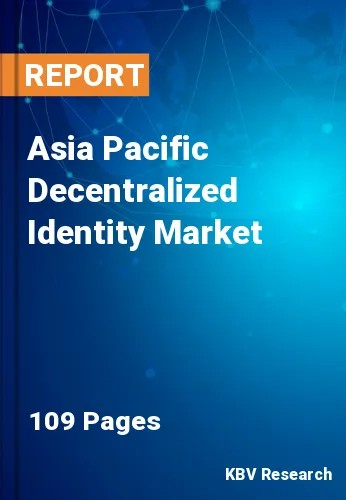The Asia Pacific Decentralized Identity Market would witness market growth of 79.6% CAGR during the forecast period (2022-2028).
The wallet serves as a secured repository for user credentials in a decentralised system. It uses encryption and biometrics to safeguard credentials, asks the user for informed consent every time credentials are sought, and hides any metadata which might contribute to credential tracking. By design, encrypted, decentralised storage systems such as blockchain are impregnable, decreasing the possibility of illegal access to steal or monetize customer data.
Though this benefits individuals' privacy and security, it also aids enterprises in reducing security concerns. Several large businesses are subject to regulations governing how they acquire, process, store, and deal with user data, and they are susceptible to sanctions and penalties even if they break the rules unintentionally or have data breaches. Organizations can streamline their compliance responsibilities and lower the risk of information misuse and being attacked in opportunistic cyber-attacks by collecting and retaining less data.
The digitization wave is sweeping Asia Pacific, and more people are joining the internet economy. Because of the rise in mobile commerce, online commerce, and social media usage, the volume of personal data available online has exploded. As a result, the frequency of fraud attempts is increasing, making it more difficult for firms to combat them. Due to this, decentralized identification solutions are becoming more popular throughout Asia Pacific. Criminal activities including identity theft and the theft of personal information have long been a problem in China and India.
To build a standard blockchain platform, the Indian government has prepared a national blockchain plan. This platform would be utilized to host an identity management application which would serve as a single point of access for various government-issued IDs, such as the Unique Health ID and other IDs issued under AgriStack, EduStack, and other platforms. The government of India is increasingly investing in the adoption of various platforms including decentralized identity, which would strengthen the official records and improve the security of the data available for the central government. Owing to this, the demand and growth of the decentralized identity market would record a spike in the coming years.
The China market dominated the Asia Pacific Decentralized Identity Market by Country in 2021, and would continue to be a dominant market till 2028; thereby, achieving a market value of $594.4 million by 2028. The Japan market is anticipated to grow at a CAGR of 78.5% during (2022 - 2028). Additionally, The India market would showcase a CAGR of 80.7% during (2022 - 2028).
Based on Identity Type, the market is segmented into Non- biometrics and Biometrics. Based on Vertical, the market is segmented into BFSI, Telecom & IT, Real Estate, Retail & Ecommerce, Government & Public Sector, Healthcare & Life Sciences, Media & Entertainment, Transport & Logistics, Travel & Hospitality, and Others. Based on Organization size, the market is segmented into Large Enterprises and SMEs. Based on End user, the market is segmented into Enterprises and Individual. Based on countries, the market is segmented into China, Japan, India, South Korea, Singapore, Malaysia, and Rest of Asia Pacific.
Free Valuable Insights: The Worldwide Decentralized Identity Market is Projected to reach USD 8.9 Billion by 2028, at a CAGR of 78.5%
The market research report covers the analysis of key stake holders of the market. Key companies profiled in the report include Accenture PLC, Microsoft Corporation, Ping Identity Holding Corp. (Vista Equity Partners), Avast Software s.r.o., Wipro Limited, Persistent Systems Limited, Civic Technologies, Inc., Nuggets Ltd., R3 LLC, and Validated ID, SL.
By Identity Type
By Vertical
By Organization size
By End user
By Country
Our team of dedicated experts can provide you with attractive expansion opportunities for your business.

